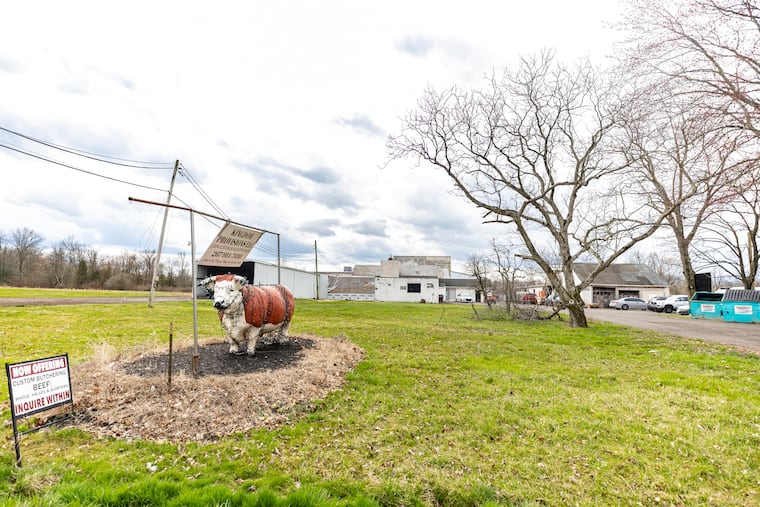‘Nuisance’ Bucks slaughterhouse hit with lawsuits for alleged farmland violations
After neighbor complaints over foul odors and animal blood, officials are seeking an injunction against Pipersville’s Kingdom Provisions.

Officials in Bucks County and Plumstead Township are accusing Kingdom Provisions slaughterhouse of violating local farmland protections after repeated complaints against the embattled Pipersville business.
The lawsuits, filed in Bucks County Common Pleas Court in July, mark the first legal action against Kingdom Provisions since neighbors began complaining of foul odors wafting from the Durham Road property early last year. In March, neighbors complained again after heavy rains washed animal blood — which Kingdom Provisions says it sprayed across a back field to fertilize the soil — onto their lawns.
Both lawsuits seek a court-ordered injunction that would shut down Kingdom Provisions until it could comply with the terms of two land easements placed on the rural property in 2022 under a previous owner.
Current owner Ephraim Stoltzfus refuted many of the allegations, saying his business rectifies issues as environmental and agricultural inspectors bring them to his attention, and that he was trying to keep up with overlapping and conflicting agency demands.
Plumstead Township filed a suit July 9 alleging that Kingdom Provisions’ composting operation — which caused “unbearable odors” to drift toward neighboring homes, according to the filing — was in violation of a township land easement.
The lawsuit cites violations handed down by the Pennsylvania Department of Environmental Protection last summer, including reports that document the slaughterhouse’s disposal of animal entrails, heads, and hides in uncovered bins outside, as well as an exposed cow carcass on an outdoor compost pile.
Plumstead’s attorneys claim Kingdom Provisions had not submitted a suitable plan to manage those odors as of the filing, as well as one that would mitigate slaughterhouse waste that risked entering nearby Cabin Run Creek. The suit also alleged violation of a public nuisance code.
After “more than a year of warnings and notices, Kingdom Provisions has failed to consistently address the complaints relating to its soil disturbances, unlawful composting, and field application of residual blood from its slaughtering operation,” the Plumstead lawsuit said.
Meanwhile, Bucks County’s lawsuit — filed jointly with the nonprofit land trust Heritage Conservancy on July 28 — alleged the county’s own land easement does not allow for slaughterhouses like Kingdom Provisions.
The suit cites language from the easement that attorneys said doesn’t allow for businesses that produce less than 50% of their product on site (Kingdom Provisions does not raise the animals it slaughters, but sources them from auctions or owners).
» READ MORE: Animal blood seeps onto neighbors’ property in latest dispute with Bucks County slaughterhouse
The suit also suggests that disposing of animal waste on the farmland was a violation of both the easement and state environmental protection guidelines.
Attorneys for Bucks County and Kingdom Provisions did not return requests for comment.
Jonathan Reiss, an attorney for Plumstead Township, said the goal of an injunction wasn’t to permanently shut down Kingdom Provisions; he recognized that before Stoltzfus arrived, another slaughterhouse had occupied the plot.
“As long as [Kingdom Provisions] comply with the terms of the conservation easement and township ordinances, the township understands they have the right to continue business,’ Reiss said.
In a rare interview, Stoltzfus described his efforts to address the turmoil.
In the March incident where animal blood seeped onto a neighboring homeowner’s lawn, for example, Stoltzfus said his staff remedied the problem by digging barriers in the soil between Kingdom Provisions and a neighbor at the recommendation of the Bucks County Conservation District.
But Plumstead Township alleged that Kingdom Provisions did not apply for a permit before digging the swales and berms; Stoltzfus said he only had a short amount of time to act to prevent another bloody overflow.
“My hands have been tied, and it’s just ridiculous,” Stoltzfus said of the allegation. “How are you going to get a permit in the matter of a day?”
Nick Lykon, the land’s previous owner who sold the plot to Stoltzfus in December, said that while he agrees his former tenant created a “public nuisance” by attempting to compost the slaughterhouse waste, Pennsylvania Department of Agriculture guidelines allow for composting when done properly.
Both Stoltzfus and Lykon said that Kingdom Provisions stopped composting at the request of Plumstead Township this summer, but that county and township officials were continuing with the lawsuits regardless.
“They’re farmers, they’re not lawyers,” said Lykon. “Nobody’s going to give them a break.”
Meanwhile, organizations like People for the Ethical Treatment of Animals would like Kingdom Provisions to face harsher penalties.
Colin Henstock, an associate director with PETA, said USDA inspectors issued two animal welfare violations to Kingdom Provisions in January and July, detailing what Henstock described as inhumane treatment of a steer and a sheep before slaughter.
Stoltzfus said one incident involved a third-party contractor, not a Kingdom Provisions staff member, and that the other was an accident that resulted in a procedure change. Both violations have since been resolved, according to the USDA, which has two permanent inspectors on site.
The Bucks County District Attorney’s Office did not immediately respond to a request for comment about whether it would open an investigation against the slaughterhouse — a move PETA requested earlier this year.